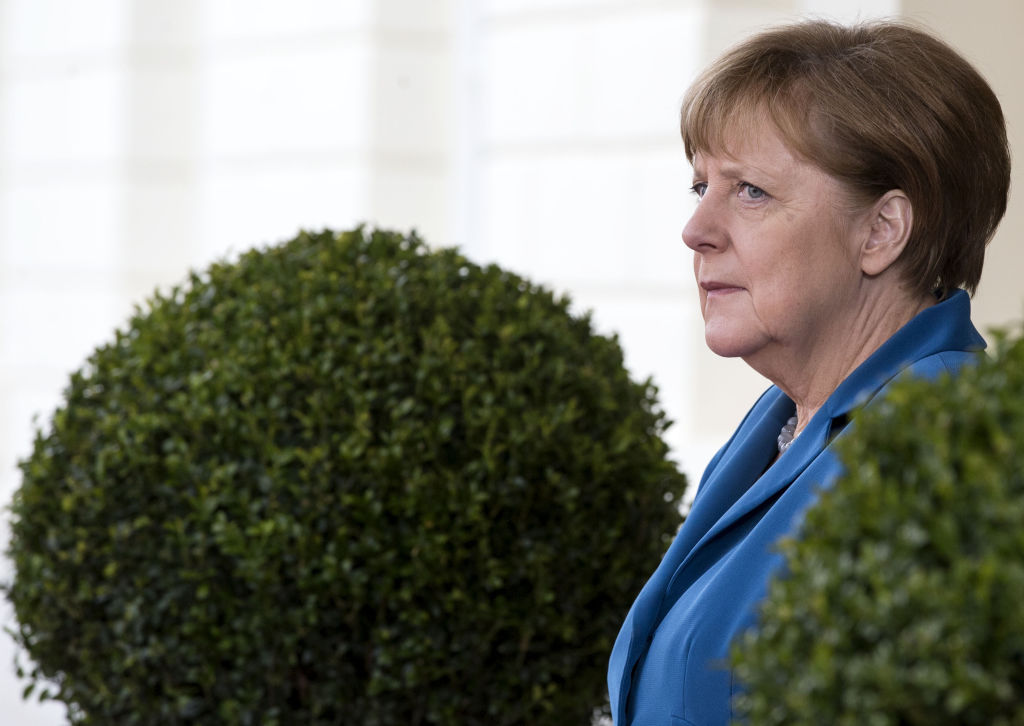The title of Angela Merkel’s newly-published memoir consists of one word: Freedom. As it happens, “freedom” was also the name and central motif of Kamala Harris’s failed campaign for the US presidency — and the comparisons between the two female politicians don’t end there. In an interview this week for the German magazine Der Spiegel, Merkel laments Donald Trump’s recent election victory, while her overall tone is closer to that of a Left-leaning US Democrat than a European conservative.
Who, then, was the last conservative German chancellor? Certainly not Merkel. One would have to say, paradoxically, that it was Gerhard Schroeder. The Social Democratic leader, who left office in 2005, advanced labour and welfare reforms which saved the country from economic decline. Though his government began Germany’s nuclear phase-out, this mostly happened on paper and was planned as a long-term process. Installed capacity for nuclear power barely changed during his tenure, but declined precipitously under Merkel, his successor and the second-longest serving chancellor in German history.
While Merkel’s conservative Christian Democratic Union (CDU) took over from a coalition between the Social Democrats and the Greens, in hindsight her policies were largely borrowed from the Green playbook. It might even be fair to call her the first Green chancellor of Germany.
This might sound hyperbolic yet, more than any of her predecessors, Merkel pushed through the energy transition which was largely responsible for the ongoing collapse of German industry. When she came into office, there was a solid 20 GW of nuclear power; by the time she departed, this had dwindled to a little over 5 GW. While Schroeder was derided as “Gas-Gerd” for his links to Russian energy companies, it was his successor who sealed German dependence on Russian gas with Nord Stream 2 and a general ban on fracking in 2017.
All of this happened at a time when Russia’s intentions for Eastern Europe were entirely obvious. Wars in Georgia and the annexation of Crimea in 2014 sent a clear signal to the West that Moscow maintained its own vision of a post-Cold War order. Whatever one thinks of Russia’s motives, smart foreign policy would have prioritised a reduced dependency on Vladimir Putin, if only for Germany to hedge its bets. Instead, Merkel went all in, holding a permanently ambiguous position on Ukraine that neither allowed for Nato membership nor the necessary rearmaments in case of Russian aggression.
When asked about this in the new Der Spiegel interview, Merkel gives no sign of remorse. In her telling, she always knew how dangerous Putin was, but cannot explain why she then proceeded to provide him with an effective veto on German industrial policy.
There are other issues on which her responses provide more questions than answers. When pressed about her decision to open the country’s borders to mass migration in 2015, Merkel asserts that the main problem is the unwillingness of the German people to learn about foreign cultures. In perhaps the pithiest line of the interview, she claims: “Life in Germany isn’t great for migrants either.”
The former chancellor argues that her policy was a balancing act between those who “are justifiably afraid of terror attacks by Islamists” and those who fear that Germany could become “too intolerant and tough”. After reading the interview, one is left with the impression that it is not the Germans who should be disappointed in their old leader; rather, it is Mutti Merkel who has reason to be annoyed with her naughty children.
Filled with scorn for average Germans who want to preserve the country they remember from their adolescence, Merkel’s comments in the interview go some way in explaining why the AfD has done so well in recent years. Unsurprisingly, the former chancellor scolds her successors in the CDU and CSU for being too hard on the Greens, whom she obviously prefers as prospective coalition partners for the conservatives after elections in February next year.
If the CDU and CSU continue in Merkel’s footsteps, the AfD looks set to become the new conservative force in Germany while her former party fades into irrelevance. After all, there is already a Green party in Germany; nobody needs another one.











Join the discussion
Join like minded readers that support our journalism by becoming a paid subscriber
To join the discussion in the comments, become a paid subscriber.
Join like minded readers that support our journalism, read unlimited articles and enjoy other subscriber-only benefits.
Subscribe